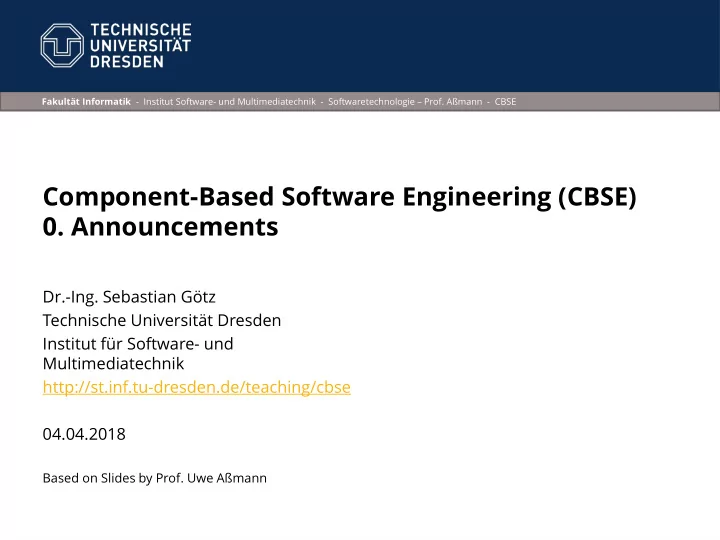

Fakultät Informatik - Institut Software- und Multimediatechnik - Softwaretechnologie – Prof. Aßmann - CBSE Component-Based Software Engineering (CBSE) 0. Announcements Dr.-Ing. Sebastian Götz Technische Universität Dresden Institut für Software- und Multimediatechnik http://st.inf.tu-dresden.de/teaching/cbse 04.04.2018 Based on Slides by Prof. Uwe Aßmann
Master‘s Courses (Hauptstudium) Component-Based Software Engineering (CBSE) 2 Softwaretechnologie I (Bachelor) (SS: Prof. Aßmann) Softwaretechnologie II (Bachelor) (WS: Dr. Götz) Software-Management Future-Proof Software Design Patterns and How to manage software Systems (Dr. Furrer) Frameworks projects (SS) (WS: Prof. Furrer) (WS: Dr. Götz) (SS: Dr. Demuth) Component-Based Software Reengineering Software as a Business Software Engineering (SS: Harry Sneed) (WS: Prof. Aßmann) (SS: Dr. Götz) Prof. U. Aßmann Automotive Software Academic Skills in Requirements Engineering Computer Science Engineering und Testen (SS: Dr. Conrad) (SS: Dr. Götz) (WS: Dr. Demuth)
Elements of the Course Component-Based Software Engineering (CBSE) Lecturing ► Do not miss one, they should give you a short and concise overview of the material ■ Reading ► Slides on “Obligatory Literature” require you to read papers from the web ■ TU Dresden has subscription to ACM Digital Library, IEEE Explorer, etc. ■ Slides on “Secondary Literature” contain useful but optional literature ■ Exercise with Dr. Thomas Kühn ► No exercise this week. ■ Exercises will start next week. ■ Oral exams usually in September, so that you have enough time to learn For exchange students, other individual dates are possible • To register for the exam Write an email to katrin.heber@tu-dresden.de • Specify the module you want to be tested in •
Reading Along the Lectures Component-Based Software Engineering (CBSE) Unfortunately, the course is not covered by any book ► About 60% is covered by the blue book “Invasive Software Composition” ■ Most of the rest on classical component systems by Szyperski in the book “Component ■ Software. Beyond object-oriented computing. Addison- Wesley.” You have to read several research papers, available on the internet ► Marked by “Obligatory Literature” ■ Secondary Literature is non-mandatory, but interesting reading. Can be done ► during the course
Obligatory Literature Component-Based Software Engineering (CBSE) During the course, read the following papers, if possible, in sequential order. ► Every week, read about 1 paper (3-4h work) ► Course web site ► Side note ► 30 LP can be interpreted as a full position (40h/week) for the whole semester ► This course captures 6 LP 8h/week ► This leaves 5h/week for self-study! (1.5h lecture, 1.5h exercise) ► Papers [McIlroy68] D. McIlroy. Mass-produced Software Components. 1st NATO ► Conference on Software Engineering. http://homepages.cs.ncl.ac.uk/brian.randell/NATO/nato1968.PDF ► (Pages 79 – 87) Others will be announced. ►
Obligatory Literature Component-Based Software Engineering (CBSE) [GOF, Gamma95] E. Gamma, R. Helm, R. Johnson, J. Vlissides: Design Patterns. ► Addison-Wesley 1995. Standard book belonging to the shelf of every software engineer. ■ The book is called GOF (Gang of Four), due to the 4 authors ■ Alternatively to GOF you can be read: ► [Freeman04] E. Freeman, E. Robson, B. Bates, K. Sierra. Head First Design Patterns: A Brain- ■ Friendly Guide. O'Reilly Media, Inc., 2004. [Völter06] Markus Völter, Thomas Stahl, Jorn Bettin, Arno Haase, Simon Helsen, ► Krzysztof Czarnecki: Model-Driven Software Development: Technology, Engineering, Management. Wiley 2006. Read Chapter 2 ►
Be Aware – There Will Be Pain! Component-Based Software Engineering (CBSE) This course is not like a standard course, it is research-oriented ► It treats rather advanced material, the concept of graybox engineering ► No single book exists on all of that at all ► ISC covers about 60% ■ Please, collaborate! ■ Read the articles ■ Ask questions! ■ Do the exercise sheets ■ The exam can only be passed successfully, if you understood all parts of the ► course. Learn continuously! One week before the exam is too late! ► Be aware: most likely, you have not yet seen larger systems ► Middle-size systems start over 100KLOC ■
The Positive Side – Why Should You Visit this Course Component-Based Software Engineering (CBSE) Component-based software engineering (CBSE) is the generalization of object- ► oriented software engineering (OOSE) If you follow carefully, ► You will discover an exciting world of graybox composition, a new way to extend software ► You will know how to arrange software reuse in your company, because component models ► and composition are the enabling technologies You will know why many companies fail in arranging a product line ► The gain is worthwhile the pain! ►
Fakultät Informatik - Institut Software- und Multimediatechnik - Softwaretechnologie – Prof. Aßmann - CBSE Component-based Software Contents and Goals
Course Content Component-Based Software Engineering (CBSE) 1. Basics • Introduction • Metamodelling • Component repositories 2. Simple black-box composition systems • UML Business components • Transparency problems and connectors • CORBA • EJB 3. Architecture Systems • ArchJava • Web services 4. Gray-box composition systems • Composition filters • Generic programming • View-based programming • Aspect-oriented programming • Invasive Software Composition 5. Applications of composition • Robotics • Mobile Applications
Main Goals Component-Based Software Engineering (CBSE) Understand the notion of a component ► With explicitly stated dependencies (in/out interfaces) ► Understand the concept of a component model ► Frameworks and product lines work with various different component models ► Variability, extensibility, and gluing are three central goals ■ There are other central concepts for component models than classes and objects ■ Understand composition techniques ► different times of composition ► dynamic composition ► Understand connectors as role models plus protocol ► Understand composition systems ■ Understand grey-box, fragment-based composition ■ why it introduces new forms of static extensibility ■ why other static component models are special cases of it ■
The End Component-Based Software Engineering (CBSE)
Recommend
More recommend